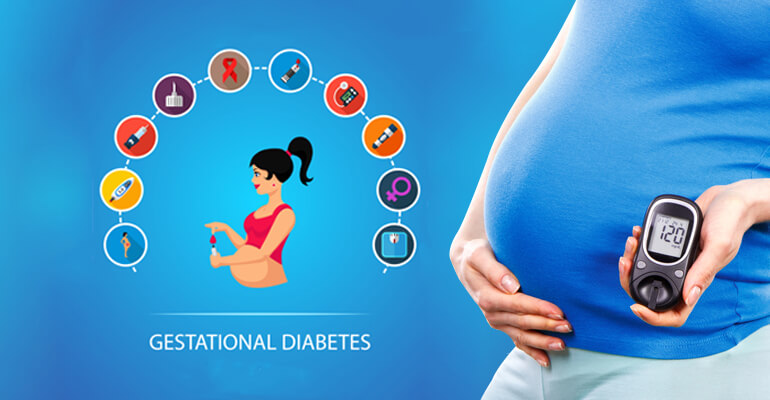Diabetes During Pregnancy Could be Dangerous, Know How and Why!
Diabetes is a major public health problem in India. Its prevalence is consistently on the rise, so is the prevalence of diabetes diagnosed during pregnancy. It is estimated that about 4 million women are affected by gestational diabetes in India, at any given time point.
Gestational diabetes is a condition in which a woman without diabetes develops high blood sugar levels during pregnancy. Gestational diabetes mellitus can be severe and can cause threat to maternal and child health. Most women with gestational diabetes have no obvious symptoms. Most women don’t know they have it until they get tested. Hence it’s essential for all pregnant women to get proper and timely screening during pregnancy. With a healthy, nutritious, well-balanced diet and close monitoring, women with gestational diabetes can continue to have a healthy and enjoyable pregnancy with few, if any, complications to mother or baby.
Any woman can develop gestational diabetes when she’s pregnant, but those with the following conditions are at a higher risk:
- Overweight or obese
- Family history of diabetes
- Gestational diabetes in past pregnancy
- Age over 25
- Ethnic background (African-American, American Indian, Asian-American, Hispanic or Latina, or Pacific Islander)
- History of glucose intolerance
- High BP during pregnancy
Gestational diabetes typically develops during a woman’s second or third trimester. All women are screened for gestational diabetes between 24 and 28 weeks of pregnancy, but women may be screened earlier in the pregnancy if they have risk factors. A glucose screening test is done during this time. For the test, the women will be asked to drink a glucose drink and have her blood glucose levels tested after one or two hours. If this test shows a high blood glucose level, a longer 3-hour glucose tolerance test will be done. If results of the second test are out of range, gestational diabetes is diagnosed.
Most women with gestational diabetes do well as long as it is adequately managed. Risks associated to the women during pregnancy are:
- High blood pressure
- Pre-eclampsia
- Swelling in hands, feet and legs
- Urinary tract infections
- Obstructed labour
- Increased requirement for forceps delivery, episiotomy or caesarean section (due to the large size of the baby)
Gestational diabetes can lead to the following risks for the baby:
- Birth defects.
- Macrosomia. This is the term for a baby that is much larger than normal.
- Increased amount of amniotic fluid in the sac surrounding the baby in the uterus
- Birth injury. Birth injury may occur due to the baby’s large size and difficulty being born.
- Trouble breathing (respiratory distress).
- Stillbirth (fetal death)
- Hypoglycemia. The baby may have low levels of blood glucose right after delivery.
- Hypocalcemia. Low levels of calcium
- Jaundice two to three days after birth
- Diabetes or obesity or heart disease later in life
Most of these complications can be prevented. It is important for women with diabetes in pregnancy to get blood sugar levels under control as soon as diagnosed and to carefully monitor their blood glucose levels throughout pregnancy to reduce the risk of adverse pregnancy outcomes. It is essential that the women gets regular and strict antenatal checkups with her Obstetrician for treatment and close monitoring of the mother and the baby throughout the pregnancy for complications.
Treatment of gestational diabetes depends on symptoms, age, general health of the women and also on how severe the condition is. Treatment may include:
- A careful diet with low amounts of carbohydrate foods and drinks
- Exercise
- Blood glucose monitoring
- Insulin injections
- Oral medicines for hypoglycemia
Women with gestational diabetes are referred to a dietitian to discuss healthy meal planning for pregnancy. She may need a Diabetologist consultation. In most cases, healthy eating and exercising will work well to control blood sugar levels in gestational diabetes. If the blood sugar levels are still not controlled, insulin or oral medicines will be prescribed. Insulin is very safe and works effectively to reduce blood glucose. It does not cross the placenta and works well at keeping mother’s and baby’s blood glucose within desired levels. But women who fear regular insulin injections may be prescribed oral medication to control blood sugar levels instead.
Gestational diabetes usually goes away on its own and soon after delivery blood sugar levels return to normal but approximately half of women with a history of gestational diabetes go on to develop type 2 diabetes within five to ten years after delivery. All women with gestational diabetes should undergo follow-up blood glucose testing at six to 12 weeks after delivery to determine if they actually have diabetes outside of pregnancy. Once a woman has had gestational diabetes, she needs to be mindful about diet and exercise for the rest of her life.


Comments ( 23,137 )